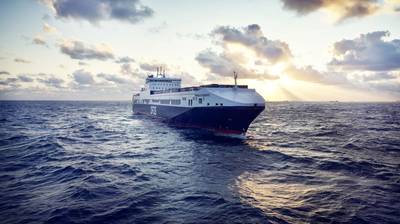DFDS Outlines Emissions Reduction Plan
Danish shipping and logistics company DFDS said it will carry out a mix of minor and major technical upgrades over the next 10 years to reduce emissions by about 45% from 2008 levels. Ultimately, the company intends to become climate neutral by 2050.
The company said it will use solutions like hull coatings and decision support systems on board vessels and in the office, as well as major fleet upgrades such as bulb and propeller modifications.
"The plan is based on careful analysis of how we operate today, and which areas have the greatest potential for improvement. It is about evolution – improving and optimizing what we have today – while the long term plan is more of a revolution – how we can do things in completely new ways," the company said.
Key among technical solutions deployed over the company's 10-year plan are tools that leverage artificial intelligence (AI) to monitor vessel operations and inform DFDS about optimized fuels use, both on routes and for individual vessels.
"Today, we have a monthly fuel report for our vessel operations, but no insights as to what is behind the numbers. We know what we use, but not how these figures are accumulated," the company said. "Our crews and their shore-side support teams need better information on how they can operate in a more fuel-efficient way."
"This new smart AI system located on the vessels’ bridge will give the crews qualified directions on what is the right speed and also real-time advice on which route will help the fuel on board last longer. After a crossing, there will be a report on what the crew has done well in terms of consuming fuel, and also where they can improve,“ said Head of Projects & Implementation in DFDS’ Technical Organisation Jacob Pedersen.
Another important factor will be hull coatings and shaping of the propeller curves for vessels to be able to sail in a more fuel-efficient manner, the company said.
“We are constantly scanning the market to pinpoint new ways of optimizing what we have,” said Vice President of DFDS’ Technical Organisation Thomas Mørk. “We continuously assess where we should set in based on where we can harvest the greatest effect. The bottom line is that not only are we saving the environment from thousands of tons of CO2 every year, we are also able to work with fuel consumption in a smarter way. In time, this will help us run our vessels cheaper and greener and that just makes good business sense.”
DFDS said it also plans to introduce small amounts of methanol in the existing propulsion machinery on many of its vessels, in the four stroke engines that make up the majority of its fleet. Together with onsite-produced hydrogen, the methanol will be injected into combustion chambers, replacing up to 10-15% of the heavy fuel oil needed to fuel the same voyage today. This technology is still under development, and DFDS said it expects it to be approved by engine manufacturers during 2020. The company said it has already done initial testing and that the results look promising.
"Through doing this, we hope to be able to push the market demand for sustainable fuels like green methanol, one of several fuel sources we continue to investigate," DFDS said. "This could have a positive ripple effect on the development of green fuel production nationally and internally."
Looking further ahead, DFDS said, "The long-term tonnage adaption plan is all about how we replace fossil fuels with the new generation of zero emission fuel. The new sustainable fuels are renewable energy stored in the form of for instance ammonia, hydrogen or methanol. Storing, handling and using these new fuels is very different to how we do things today. We need to learn a lot to be able to make the right strategic decisions. Projects and partnerships will help us learn and share knowledge and reach our goals. The long-term tonnage adaption plan focuses on our new generation of ships."
DFDS CEO Torben Carlsen said, “I am very happy that we now have this ambitious and comprehensive climate action plan in place. It clearly states how we can and will take responsibility for the environment. It will also help us stay relevant as a service provider in 10, 15, 50 years from now. With the support of every one of our employees, we will be able to turn this plan into reality and at the same time continue our existing efforts to support the environment and local communities.”
While 90% of the roughly 2 million C02 emitted by DFDS in 2019 came from its vessels, the company said it will also address the remaining 10% through initiatives like electric trucks, energy consumption for buildings and hybrid/electric company cars.














